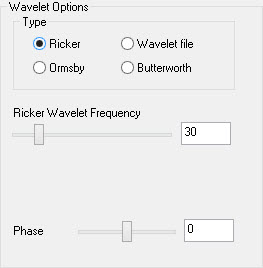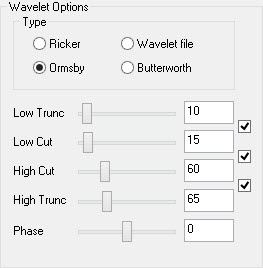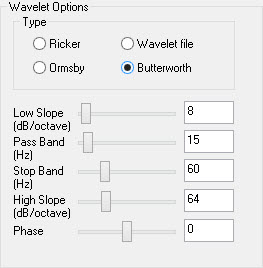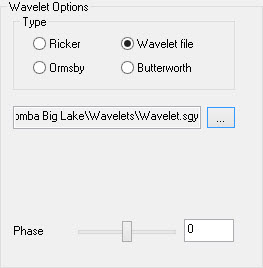Generate Synthetic: Wavelet Options
When generating a synthetic in the Generate Synthetic application, or
in the Seismic Viewer, there are four wavelet options to choose
from.
Wavelet Options
Note: The wavelet length used for generation is 200 ms, unless using an extracted wavelet.
Ricker
If
set this
will allow you to define a Ricker wavelet
at the given frequency.

Ricker Wavelet Frequency: Use the slider to adjust the central frequency of the Ricker wavelet.
Phase: Use
this slider to adjust the phase of the input wavelet.
Ormsby
If
set this
will allow you to define an Ormsby (bandpass) wavelet
using the given
frequencies.

Low
Trunc:
Set the low
truncation frequency of the wavelet in Hertz.
Check the toggle to lock the difference between the Low Trunc and Low Cut frequencies.
Low Cut:
Set the low
cut frequency of the wavelet in Hertz.
Check the toggle to lock the difference between the Low Cut and High Cut frequencies.
High
Cut:
Set the high
cut frequency of the wavelet in Hertz.
Check the toggle to lock the difference between the High Cut and High Trunc frequencies.
High
Trunc:
Set the
high truncation frequency of the wavelet in Hertz.
Phase: Use
this slider to adjust the phase
of the input wavelet.
Butterworth
If set this will allow you to define a Butterworth wavelet using the given frequencies.

Low Slope: Set the slope of the wavelet on the pass band frequency side specified in decibels per octave. The slope determines how quickly the power is scaled up from 0 to half power (at the pass band frequency). Frequencies on this side are also smoothly ramped up using a cosine taper. Low frequency slopes usually are between 9 and 18 dB/octave.
Pass Band Freq: Set the frequency in Hertz at which the amplitude is down by 3dB. The amplitudes between the pass band frequency and the frequency cutoff (midpoint between the pass and stop band frequencies) are ramped from half power to full power.
Stop Band Freq: Set the frequency in Hertz at which the amplitude is down by 3dB. The amplitudes between the stop band frequency and the frequency cutoff (midpoint between the pass and stop band frequencies) are ramped from half power to full power.
High Slope: Set the slope of the wavelet on the stop band frequency side specified in decibels per octave. The slope determines how quickly the power is scaled from half power (at the stop band frequency) down to 0. Frequencies on this side are also smoothly ramped down using a cosine taper. High frequency slopes usually are between 36 and 72 dB/octave.
Phase: Use this slider to adjust the phase of the input wavelet.
Wavelet
File
Select
a
wavelet from a file. The file needs to be a single trace SEG-Y file.
You can import this from another package, or use the Extract
Wavelet dialog in
the Seismic Viewer to get a wavelet.

Also See
— MORE INFORMATION

|
Copyright © 2020 | SeisWare International Inc. | All rights reserved |